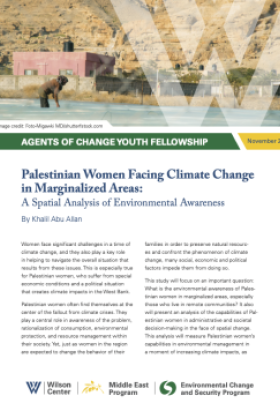Palestinian Women Facing Climate Change in Marginalized Areas: A Spatial Analysis of Environmental Awareness



The marginalized Palestinian areas in the West Bank are considered among the global places that are most affected by climate change. The impacts in this region vary across regions, generations, age, classes, income groups, and gender. Palestinian women often find themselves at the center of the fallout from these climate crises. They play a central role in awareness of the problem, rationalization of consumption, environmental protection, and resource management within their society—and they are expected to change the behavior of their families in order to preserve natural resources in the face of climate impacts. Yet, environmental awareness among women in the West Bank is dangerously low as a result of social factors such as early marriage, weak political and security stability in the region, as well as economic factors such as unemployment. Within this context, it is crucial to determine pathways to achieving fairness and equity in access to resources and enhancing the role of women in climate action.
Author

Faculty Member, Hebron University, West Bank

Middle East Program
The Wilson Center’s Middle East Program serves as a crucial resource for the policymaking community and beyond, providing analyses and research that helps inform US foreign policymaking, stimulates public debate, and expands knowledge about issues in the wider Middle East and North Africa (MENA) region. Read more


Environmental Change and Security Program
The Environmental Change and Security Program (ECSP) explores the connections between environmental change, health, and population dynamics and their links to conflict, human insecurity, and foreign policy. Read more




